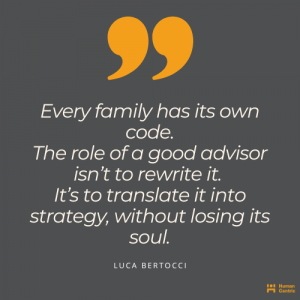What Family-Owned Businesses Can Teach Us About Strategy That Big Corporations Often Miss

Rooted in tradition, driven by conviction — like a well-tended vineyard, strategic execution in family businesses grows strongest when nurtured from the top.
Luca Bertocci’s latest article reveals how family businesses execute strategy better—when top leadership drives quiet, decisive alignment.
Written by Luca Bertocci, university lecturer and co-owner of boutique consultancy Human Centric Group, the article draws from over 20 years of advisory experience with global leaders in sectors such as consumer goods, retail, manufacturing, and technology. Having worked across more than 30 countries, Bertocci distills what actually drives alignment inside organizations where leadership isn’t just a job title—it’s a generational commitment.
Rather than offering a framework or textbook model, Bertocci focuses on lived experience and nuance. He argues that in family businesses, strategy takes hold not because it’s mandated, but because it’s deeply believed.
“When the top is involved—really involved—everything moves differently,” Bertocci writes. “Execution happens, resistance fades, and strategy becomes a shared commitment instead of a PowerPoint.”
Why Family Businesses Outperform
The article challenges corporate assumptions that family-run companies are outdated or resistant to change. In fact, many show extraordinary adaptability and longevity—especially in regions like Italy, Spain, Portugal, and Turkey, where businesses often span multiple generations.
These enterprises don’t follow the same playbook taught in MBA programs. They’re guided by rituals, values, and unwritten rules—what Bertocci calls “quiet strategic intent.” That intent often comes from a founder or heir who may not dominate meetings but whose belief in a project drives decisions across departments.
“Every family has its own code. The role of a good advisor isn’t to rewrite it. It’s to translate it into strategy, without losing its soul,” Bertocci notes.
When owners or senior family members show visible conviction, strategic momentum follows. Teams align. Resistance drops. Middle managers stop buffering and start bridging.
What Big Corporates Often Miss
In large corporations, execution breakdowns are often framed as operational issues. But Bertocci suggests they’re often something else entirely: misalignment at the top.
He outlines familiar symptoms:
• Ideas that stall for lack of sign-off
• Sales teams that “wait for the nod”
• Strategy documents that get bigger, but less clear
• Senior leaders who quietly admit, “I’m not sure what we’re trying to be anymore”
In family businesses, when conviction exists at the highest level, none of these symptoms appear. Everyone knows where they’re going—and why.
A Call for Discreet, Strategic Partnership
The article also makes a compelling case for a role many family companies don’t even realize they need: a discreet strategic advisor who helps them clarify how the brand shows up, internally and externally—not through slogans, but through decisions that are coherent, aligned, and culturally grounded.
Bertocci writes from first-hand experience, having quietly advised multiple owners and boards navigating legacy transitions, rebrands, and cross-generational shifts. He cautions against the use of off-the-shelf consulting models in family enterprises. What works in a public multinational with distributed governance often falls flat in environments driven by history, intuition, and emotional logic.
“Pushing a ready-made solution, even if brilliant, can be like trying to teach a foreign language by raising your voice. It won’t land. Not because they didn’t hear you. Because it wasn’t their language.”
For Those Thinking in Decades, Not Quarters
The article resonates with a specific type of leader—one who sees their company not just as a financial engine, but as a legacy. It also speaks to trusted advisors, board members, and private equity partners working with family-controlled businesses and seeking greater alignment.
Whether you're advising, investing in, or leading a family enterprise, the message is clear: when the top is aligned, execution doesn’t need to be pushed—it flows.
Read the Full Article
The full article “What Family Companies Teach Us About Strategic Execution” is available now at:
Norwalk’s 25 Van Zant Recognized as OBBBA-Compliant Facility for Industry
Emma Memma Makes Her Canadian Performance Debut with Live Appearances in Toronto and Edmonton
VSee Health, Inc. Receives Nasdaq Delisting Determination and Plans to Request Reconsideration
Więcej ważnych informacji
 Jedynka Newserii
Jedynka Newserii

 Jedynka Newserii
Jedynka Newserii

Handel

Mercosur to tylko wierzchołek góry lodowej. UE ma ponad 40 umów handlowych, które mogą destabilizować rynek rolny
Umowa handlowa między UE a krajami Mercosur może znacząco zaburzyć konkurencję na rynku rolnym i osłabić pozycję unijnych, w tym polskich, producentów – ostrzegają rolnicy i producenci żywności. Umowie sprzeciwia się część krajów unijnych, które domagają się klauzuli ochronnych oraz limitów importowych. – Problemem jest jednak nie tylko ta konkretna umowa. Chodzi o cały system wolnego handlu, który się kumuluje z dziesiątek innych porozumień – podkreśla Andrzej Gantner, wiceprezes Polskiej Federacji Producentów Żywności.
Firma
Dzięki zdalnej weryfikacji tożsamości z wykorzystaniem AI firmy zminimalizowały liczbę oszustw. Rozwiązania wykorzystuje głównie sektor finansowy

Z najnowszych danych Eurostatu wynika, że w 2024 roku 5,9 proc. polskich firm korzystało z rozwiązań z zakresu sztucznej inteligencji. W 2023 roku był to odsetek na poziomie 3,67 proc. Wciąż jednak jest to wynik poniżej średniej unijnej, która wyniosła 13,48 proc. Jednym z obszarów, który cieszy się coraz większym zainteresowaniem wśród przedsiębiorców, jest weryfikacja tożsamości przez AI, zwłaszcza w takich branżach jak bankowość, ubezpieczenia czy turystyka. Jej zastosowanie ma na celu głównie przeciwdziałać oszustwom i spełniać wymogi regulacyjne.
Prawo
Daniel Obajtek: Własne wydobycie i operacyjne magazyny to filary bezpieczeństwa. Zgoda na magazyny gazu poza krajem to rezygnacja z suwerenności energetycznej

Były prezes Orlenu ostrzega przed zmianami w ustawie o zapasach ropy naftowej, produktów naftowych i gazu ziemnego. Jego zdaniem przygotowana przez rząd nowelizacja tzw. ustawy magazynowej i ujednolicanie unijnej polityki energetycznej to zagrożenie dla bezpieczeństwa energetycznego Polski. W jego opinii tylko silna spółka narodowa, własne wydobycie, krajowe magazyny i zbilansowany miks energetyczny zapewnią Polsce bezpieczeństwo i konkurencyjność.
Partner serwisu
Szkolenia

Akademia Newserii
Akademia Newserii to projekt, w ramach którego najlepsi polscy dziennikarze biznesowi, giełdowi oraz lifestylowi, a także szkoleniowcy z wieloletnim doświadczeniem dzielą się swoją wiedzą nt. pracy z mediami.






![Nestlé w Polsce podsumowuje wpływ na krajową gospodarkę. Firma wygenerowała 0,6 proc. polskiego PKB [DEPESZA]](https://www.newseria.pl/files/1097841585/fabryka-nesquik_1,w_85,r_png,_small.png)



.gif)

 |
| |
| |
|